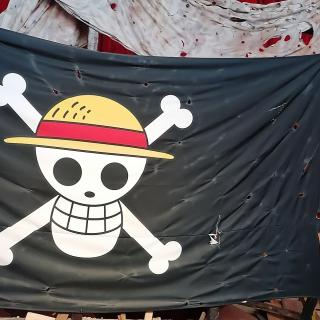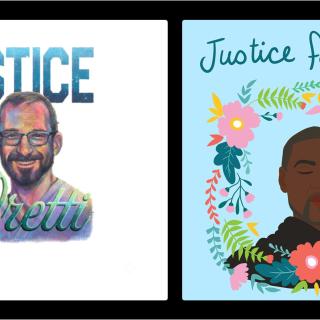Advertisement
The president of the Fraternal Order of Police (FOP) Capital City Lodge #9 – the union for Central Ohio law enforcement – called a local activist group “terrorists” because they had plans to protest at the home of the parents of the Blendon Township officer believed to have killed Ta’Kiya Young in the Kroger parking lot.
The union’s president, Brian Steel, also a Columbus police sergeant, posted this over the weekend (just before September 11th) to his personal Twitter account: “This is the terrorist group who plans to protest the home of innocent senior citizens.” Steel was referring to Columbus Emergency Direct Action Reserve, or CEDAR, self-described as “a collective of community members committed to see anticolonial abolitionist direct actions.”
CEDAR responded to Steel on Instagram, stating: “What we want is public safety, what we have is killer kops who run around abusing citizens. We want our community to come together and create and implement grassroots public safety measures that meet the needs of people who have been alienated and isolated by a capitalist society.”
CEDAR’s social media reveals they are advocate for mutual aid, ending homeless camp sweeps in Columbus, and protesting Nationwide Insurance’s coverage of Atlanta’s “Cop City.”
CEDAR’s Instagram suggests the protest at the parent’s home of the Blendon Township officer took place, but the Free Press could not confirm this. Steel also tweeted, “The men and women @capcityfop (Capital City Lodge #9) vehemently denounces any group who harasses or intimidates the Officer or Ms. Young’s family.”
While Steel sounds empathetic calling for Ta’Kiya’s family’s safety, his sympathy rings hollow. A quick review of his recent Twitter posts suggests he has little sympathy for Ta’Kiya. For instance, before the “terrorist” Tweet, he posted pictures of her standing with a young man pointing a gun at the camera.
Steel also wrote this on Twitter about CEDAR’s protest at the parent’s home: “Regardless of what your opinion is regarding Ms. Young or the Officers involvement in incident, you are complete trash if you are ok with this.”
But what are you, when shaming the recently departed on social media? Did Steel call the Neo-Nazi “Blood Tribe” terrorists when they protested Land Grant’s drag brunch back in April?
Ta’Kiya Young’s death was a terrible mix of poor decisions and a lack of de-escalation training. But the bottom line is, Kroger is a $100 billion corporate monster – just ask their store employees – and shoplifting should never mean pulling a gun on a young mother and her unborn baby, let alone killing both.
The community has become split once again from another police-involved shooting. When Cythina Brown of the Ohio Coalition to End Qualified Immunity tells us some young African Americans are telling their families “If the police can get away with it then I can get away with it.” Is it any wonder why violent crime and theft have spiked in Columbus since the deaths of George Floyd, Casey Goodson Jr., Donovan Lewis, and others?
Troubling is how this isn’t the first time Columbus police has called activists “terrorists” or part of a “hate group.” After the protests of 2020, the Columbus police commander and supervisors of the Internal Affairs Bureau expressed opinions that Black Lives Matter (BLM) should be on the City’s official list of hate groups.
“Can BLM be added as a defined ‘Hate’ group based on the violent protests?” wrote Columbus police Lt. Duane Mabry in 2020 to the FOP Capital City Lodge #9.
The Free Press at the time could not verify whether Cap City Lodge #9 requested City Council to designate BLM a hate group.
“It is concerning that the person who is in charge of Internal Affairs, the bureau that is responsible for investigating the complaints filed by the protestors, also believes that Black Lives Matter is a hate group,” said Columbus police Lt. Melissa McFadden to Free Press reporter Edie Milligan Driskill back in 2020.
Lt. McFadden, who is seeking change from within, gained national attention late in 2020 when she published “Walking The Thin Black Line,” a memoir describing her 25-year effort to confront racism and unprofessionalism within the Division, and the retaliation from fellow officers that followed.
The Columbus Division of Police – as so many of us are aware – stands out as one of the most rogue law enforcement agencies in the nation. Its record of killing Black people is also disturbing. Columbus police killed 40 people from 2013 to 2019, and 27 of them were Black. A number three times greater than any other agency in the state of Ohio.
In the late 1990s the US Department of Justice filed a lawsuit against the Columbus Division of Police for too many excessive force complaints, civil rights violations, false arrests and charges, and improper search and seizures. But the Cap City Lodge #9 and supportive local office holders negotiated a dismissal of the DOJ’s lawsuit and thus no consent decree was ever set up.
The Division has acted above the law for decades. More recently, City leadership demanded a culture change within the Division. But City leadership told the Dispatch they were met with “fierce opposition.”
What many passionate activists are asking for is the Division to act professionally and not call a group of peace-pushing lefties a group of “terrorists” who should be treated as if they are violent terrorists.



